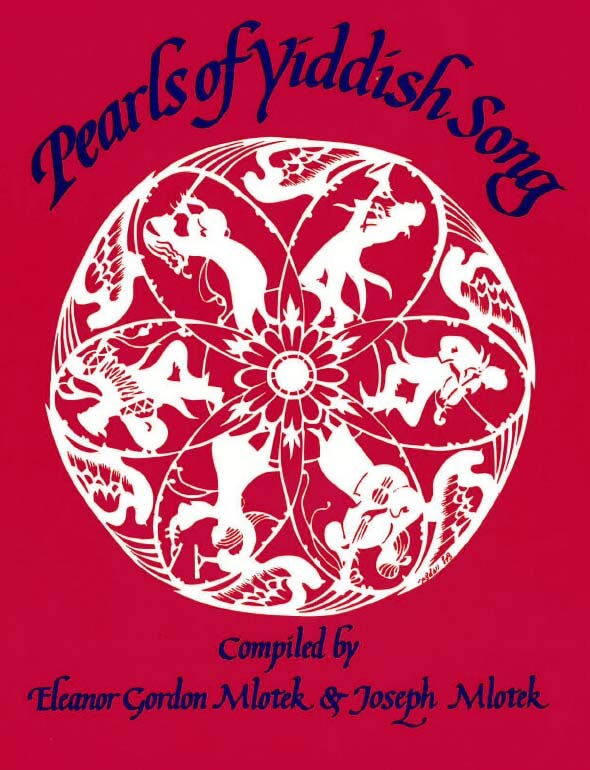Macaronic folksong published in 1918 by M. Kipnis that combines Yiddish, Hebrew and Ukrainian. It’s an example of how a common Ukrainian folksong was interpreted by division into Hebrew syllables, which in turn translate into a Hassidic psalm to the Lord. This song was a favorite of an old friend, Uriel Weinreich, who was deeply involved in the study of mixed language songs.

As I strolled in the forest, I heard a heavenly voice sing: “Katarina, moloditsa poydi syuda” [In Ukrainian: Catherine, young maiden, come here.] What do these words mean?
“Kat” means “kite” [Hebrew: sect], “rino” means “song,” and together it means “Kat rino… moloditsa poydi syuda!”
“Mole” means “full,” “ditso” means “joy,” and together… “Kat/rino/mole/ditso…”
“Podiso” means “You have redeemed us,” “shaday” means “Lord, You alone,” and together… “Kat/rino mole ditso podiso shaday”
A sect of song, full of joy; You have redeemed us, You alone, dear Lord. Everyone shout all together, sing with joy this way: “Kat rino, mole ditso, podiso shaday!”
Ani holakhti beyar ushomati bas kol:
— “Katerina moloditsa poydi syuda!”
“Katerina, moloditsa, poydi syuda”
— vos meynt men?
“Kat” iz dokh a kite,
“Rino” iz dokh gezang,
In eynem makht dos:
“Kat rino — moloditsa — poydi syuda!”
“Moloditsa”, “poydi syuda”
— vos meynt men?
“Mole” — iz dokh ful,
“Ditso” — iz dokh freyd,
In eynem makht dos:
“Kat rino mole ditso, poydi syuda!”
“Poydi syuda,” “poydi syuda”
— vos meynt men?
“Podiso” — du host dokh oysgeleyzt,
“Shaday” — gotenyu aleyn.
In eynem makht dos:
“Kat rino, mole ditso, podiso shaday!”
A kite fun gezang, ful mit freyd,
Host undz oysgeleyzt, gotenyu.
Zingt zhe ale, ale in eynem,
Zingt zhe freylekh ot azoy:
“Kat rino, mole ditso, podiso shaday!”
אַני הלכתּי ביער ושמעתּי בת־קול:
— „קאַטאַרינאַ מאָלאָדיצאַ פּױדי סיודאַ!‟
„קאַטאַרינאַ, מאָלאָדיצאַ, פּױדי סיוראַ‟ — װאָס מײנט מען?
„כּתּ‟ — איז דאָך אַ כּיתּה,
„רינה‟ — איז דאָך געזאַנג,
אין אײנעם מאַכט דאָס:
„כּתּ רינה — מאָלאָדיצאַ, פּױדי סיוראַ!‟
„מאָלאָדיצאַ, סױדי סיודאַ‟ — װאָס מײנט מען?
„מלא‟ — איז דאָך פֿול,
„דיצה‟ — איז דאָך פֿרײד.
אין אײנעם מאַכט דאָס:
„כּתּ רינה, מלא דיצה, פּױדי סיודאַ!‟
„פּױדי סיודאַ‟, „פּױדי סיודאַ‟ — װאָס מײנט מען?
„פּדתה‟ — דו האָסט דאָך אױסגעלײזט,
„שדי‟ — גאָטעניו אַלײן.
אין אײנעם מאַכט דאָס:
„כּתּ רינה, מלא דיצה, פּדית שדי!‟
אַ כּיתּה פֿון געזאַנג, פֿול מיט פֿרײד,
האָסט אונדז אױסגעלײזט, גאָטעניו.
זינגט זשע אַלע, אַלע אין אײנעם,
זינגט זשע פֿרײלעך אָט אַזױ:
„כּתּ רינה, מלא דיצה, פּדית שדי!‟
Song Title: Katerina Moloditsa Poydi Syuda

First published in 1988 as Pearls of Yiddish Song: Favorite Folk, Art and Theatre Songs, this anthology contains 115 songs. Some material had never been published, while others, included in rare song collections or sheet music, were largely inaccessible. The songs presented reflect Jewish life in Eastern Europe and the United States and depict childhood, love, family celebrations, poverty, work and struggle. There are also songs from the Hasidic and Maskilic movements, songs of Zion and of America, as well as songs from the Yiddish theater.
The title of this anthology derives from the weekly two-page feature column “Pearls of Yiddish Poetry,” which the compilers Yosl and Chana Mlotek initiated in 1970 in the Yiddish newspaper Der Forvertz (the Yiddish Daily Forward). Hundreds of readers from around the world — including authors, composers, singers, actors — became co-participants in this collective folk project and recalled melodies, lines, fragments, stanzas and their variants of songs, poems, and plays which they had heard in their youth. At first, readers sent in only written material. Later, they also taped songs on cassettes, many of whose melodies had, until then, never been recorded. They also identified and supplied missing information regarding lyricists, poets, and composers and described the circumstances surrounding the songs’ origins, their dissemination, diffusion and impact.